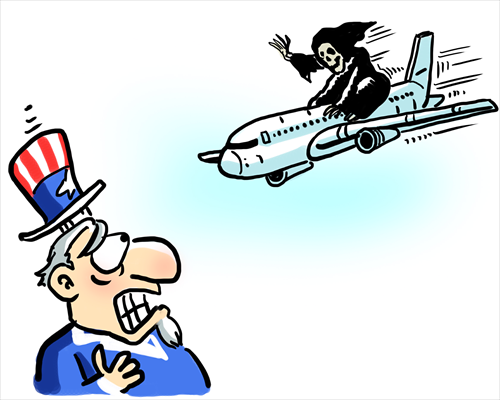Ebola crisis causing storms in Washington as response questioned

Illustration: Liu Rui/GT
The White House's slow response to the Ebola crisis at home and abroad is creating political tensions in the US.
The Obama administration's recent steps to restrict airport entry to the US and to send aid workers to Africa, however, are positive. Also, across the US there is now a flurry of activity at the state and local level to coordinate an emergency Ebola response.
For several decades in the US, university students studying international relations have been taught about new emerging global "soft security" issues such as epidemic and pandemic disease threats. Teachers, practitioners, and students in public health management across the US, also wrestle with these complex and difficult issues.
But more than a few eyebrows were raised recently when the Obama administration appointed Ron Klain, a political operative and lawyer to head up Washington's response to Ebola. With good reason people ask why a well-known public health professional was not appointed. Instead the country got a political fixer with a questionable record.
The White House in downplaying the crisis issued misleading statements about the transmission of Ebola, some medical professionals say. Contrary to White House statements on transmission, the disease can spread via aerosols emitted from the body through sneezing and coughing, they say. But not enough is known yet, particularly about mutations of the virus.
Effective Ebola treatment requires what is called in the US a special "Level 4" facility. There are only four such hospital facilities in the entire US. Cutbacks in healthcare and medical research are part of the problem. Many hospitals and health facilities, however, can be quickly upgraded to handle Ebola patients.
Response to the Ebola crisis has been hampered by political correctness and spin to deceive the public, critics say. They accuse the Centers for Disease Control and Prevention (CDCP) of missteps due to such considerations.
Improper guidance was initially released by the CDCP concerning safe medical procedures for handling patients for treatment. While full protective gear and respirators initially were not called for, procedures have changed in recent days and the CDCP has acknowledged mistakes.
Doctors Without Borders has been effective in its work in West Africa since March. The organization criticizes not only the CDCP but also the World Health Organization for failure to respond properly in a timely manner.
Although the crisis escalated dramatically and will continue to do so, effective treatment and control is possible. A major cause of death is shock from rapid loss of body fluids, but mortality rates can be significantly lowered with proper facilities and equipment as well as with early procedures and care.
In the US military and the intelligence communities naturally follow developments. The highest levels of the US military have revealed concerns in public.
The Chairman of the US Joint Chiefs of Staff General Martin E. Dempsey told CNN on October 16 that he has had concerns for the last several months about Ebola as a global threat.
On October 7 at the US National Defense University, US Marine Corps General John F. Kelly, head of the Southern Command, expressed grave concerns over the potential for the disease to penetrate the Caribbean and Central America. He said that possible mass displacements of persons owing to panic could lead to increased pressures at US borders.
Transnational criminal organizations involved in human trafficking are a potential factor as are certain Islamic terrorist organizations. The Obama administration must press ahead with all speed to fight the Ebola crisis.
The author is an educator and former senior professional staff member of the Senate Committee on Foreign Relations. opinion@globaltimes.com.cn